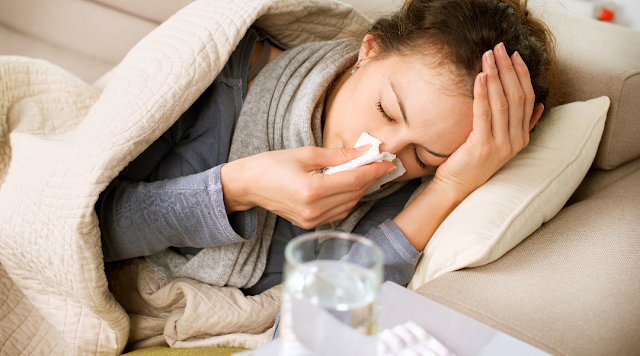How to Prevent the Flu and Other Viral Infections
Hey there! Are you looking for ways to protect yourself from the flu and other viral infections? Preventing these infections is crucial for maintaining your health, especially during flu season. Let's explore some effective strategies to help you stay healthy and avoid getting sick.
Get Vaccinated
One of the most effective ways to prevent the flu is by getting vaccinated. The flu vaccine can significantly reduce your risk of getting the flu and its complications. It's recommended to get the flu vaccine annually, as the flu virus strains can change each year.
In addition to the flu vaccine, stay up to date with other vaccinations, such as the COVID-19 vaccine and any other recommended vaccines. Vaccinations help protect you and those around you from serious viral infections.
Practice Good Hand Hygiene
Washing your hands regularly is one of the simplest and most effective ways to prevent the spread of viruses. Use soap and water to wash your hands for at least 20 seconds, especially after coughing, sneezing, using the restroom, and before eating.
If soap and water are not available, use an alcohol-based hand sanitizer with at least 60% alcohol. Avoid touching your face, especially your eyes, nose, and mouth, as viruses can enter your body through these areas.
Maintain Social Distance
Maintaining social distance can help reduce the spread of viral infections. Try to keep a distance of at least 6 feet from people who are coughing, sneezing, or showing signs of illness.
Avoid crowded places and large gatherings, especially during flu season or when there are outbreaks of other viral infections. If you need to be in close contact with others, wearing a mask can help reduce the risk of transmission.
Wear a Mask
Wearing a mask can help prevent the spread of respiratory viruses, especially in situations where social distancing is challenging. Masks can block respiratory droplets that may contain viruses, reducing the risk of transmission.
Wear a mask that covers your nose and mouth, and ensure it fits snugly against the sides of your face. Wash your hands before putting on and taking off your mask, and avoid touching the mask while wearing it.
Boost Your Immune System
Supporting your immune system can help your body fight off infections more effectively. Here are some ways to boost your immune system:
- Eat a Balanced Diet: Consume a variety of fruits, vegetables, whole grains, lean proteins, and healthy fats to provide your body with essential nutrients.
- Stay Hydrated: Drink plenty of water to keep your body hydrated and support immune function.
- Exercise Regularly: Engage in regular physical activity to improve circulation and overall health.
- Get Enough Sleep: Aim for 7-9 hours of sleep per night to support your immune system and overall well-being.
- Manage Stress: Practice stress-reducing techniques such as meditation, deep breathing, and yoga to support immune health.
Clean and Disinfect
Regularly cleaning and disinfecting frequently-touched surfaces can help reduce the spread of viruses. Use household cleaners and disinfectants to clean surfaces such as doorknobs, light switches, countertops, and electronics.
Follow the instructions on the cleaning products for effective use. Pay special attention to areas that are commonly touched by multiple people, such as shared workspaces and public facilities.
Stay Informed
Stay informed about the latest information on viral infections and outbreaks. Follow updates from reputable sources such as the Centers for Disease Control and Prevention (CDC) and the World Health Organization (WHO).
Understanding the current situation and recommended precautions can help you take appropriate measures to protect yourself and others. Be aware of any travel advisories and public health guidelines to stay safe.
Avoid Close Contact with Sick Individuals
If someone in your household or close contact is sick, take extra precautions to prevent the spread of the infection. Keep a distance from the sick individual, and provide them with a separate room and bathroom if possible.
Encourage the sick person to wear a mask and practice good hygiene, such as covering their mouth and nose when coughing or sneezing. Disinfect shared surfaces and wash your hands frequently to reduce the risk of transmission.
Practice Respiratory Hygiene
Practicing good respiratory hygiene can help prevent the spread of respiratory viruses. Cover your mouth and nose with a tissue or your elbow when you cough or sneeze. Dispose of used tissues immediately and wash your hands afterward.
Avoid spitting in public places, as respiratory droplets can spread viruses to others. By practicing respiratory hygiene, you can help protect yourself and those around you from infections.
Stay Home When Sick
If you're feeling unwell or showing symptoms of a viral infection, such as fever, cough, or body aches, stay home to prevent spreading the virus to others. Rest and take care of yourself to support your recovery.
Contact your healthcare provider if you have any concerns or if your symptoms worsen. Follow their guidance on managing your symptoms and when it's safe to return to work or public activities.
Conclusion
Preventing the flu and other viral infections involves a combination of vaccination, good hygiene practices, social distancing, and supporting your immune system. By getting vaccinated, practicing good hand hygiene, maintaining social distance, wearing a mask, boosting your immune system, cleaning and disinfecting surfaces, staying informed, avoiding close contact with sick individuals, practicing respiratory hygiene, and staying home when sick, you can reduce your risk of getting sick and protect those around you. Stay healthy and take care!










